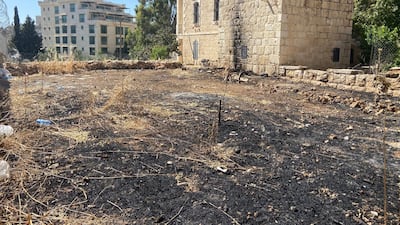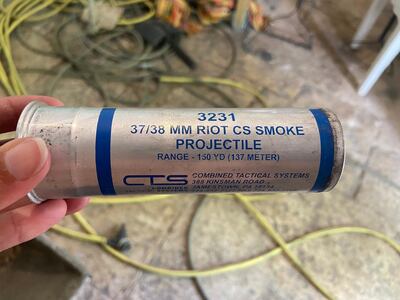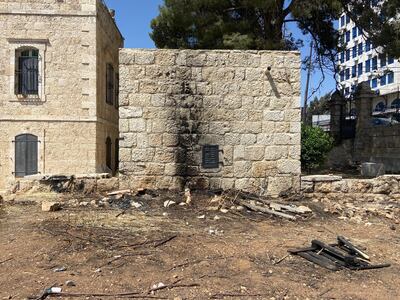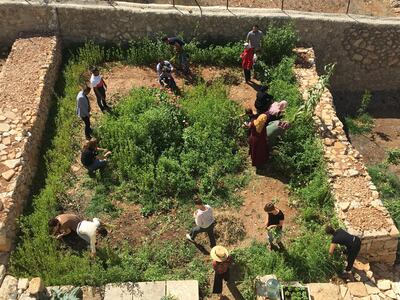On Saturday, the Dar Yusuf Nasri Jacir for Art and Research, known as Dar Jacir, in Bethlehem, the West Bank, was raided and ransacked, resulting in property damage and loss.
Aline Khoury, managing director of Dar Jacir, told The National that the Israeli army entered the centre in the middle of the night and used it as a vantage point to target protesters on the street. No injuries were sustained by the Dar Jacir team.
"They raided it and used the rooftop to shoot at the Palestinian protesters," she says.
Three witnesses, including neighbours and shopkeepers in the area, confirmed to the Dar Jacir team that they saw the Israeli army enter the garden and up to 12 Israeli soldiers on the roof.
The Israel army had not responded to The National's request for comment by the time this article went to press.

The next day, the centre’s team found the site littered with tear gas canisters, rubber bullets and smoke projectiles, Khoury recounted.
As seen in photographs shared by Dar Jacir, the labels on the projectiles reveal that they were made by Combined Tactical Systems or Combined Systems, Inc, a US company that supplies such products to the Israeli military. A tear gas grenade with a label in Hebrew was also found in the garden.
Dar Jacir's verdant urban farm, where cultural programming takes place, is now scorched earth. The doors had been broken down and items had gone missing. "They decided to go through all the rooms. They took things with them; equipment, books, cameras, laptops," Khoury says.
The arts centre, which was established in 2014 by sisters and lauded filmmakers Emily Jacir and Annemarie Jacir, sits among historical and political landmarks. It is located on Jerusalem-Hebron Road, which connects Jerusalem and Bethlehem. Across from it is the Azza or Beit Jibrin refugee camp and behind it is the Aida camp, both of which were established in 1950 after the Nakba, when almost a million Palestinians were displaced from their homes.
Dar Jacir, which was formerly the Jacir family home in the 19th century, is 200 metres from the separation wall, also known as the Israeli West Bank barrier. Close by, a watchtower monitors the neighbourhood.
“We are in the middle of history. That’s where the house stands today. It’s a street where Palestinians go on marches,” Khoury says. “So our street is always active. There are always people going out to have their voices heard and responding to what’s happening in Palestine.”
On Tuesday, the same street was filled yet again with protesters for a general strike in response to the violence inflicted on Palestinians in the Al Aqsa compound and Gaza, as well as attempts to forcefully displace families in Sheikh Jarrah.
While the Dar Jacir team have been able to secure the centre, they are still waiting for the Israeli army to provide accounts for the incident.
“It’s important to let them know that we’re not going to let it pass … This is private property. It’s an arts centre and it’s meant to serve the community. We want to make sure this doesn’t happen again,” Khoury says.
Since its opening, Dar Jacir has engaged with the artistic community through workshops, seminars, classes and other forms of cultural exchange. In 2018, the centre launched a residency programme open to local and international artists, writers, filmmakers, musicians and researchers who spent time in Bethlehem. Their list of previous residents include Jumana Manna, Nicolas Jaar, Trevor Paglen and Coco Fusco.
It has also undertaken significant archival projects, including a partnership with the Institute of Palestine Studies to map an extensive newspaper and magazine collection.
By 2019, Emily Jacir and historian Munir Fakher Eldin were able to quantify and categorise 3,861 entries from the Dar Jacir periodicals, including more than 2,900 Palestinian local newspapers dating back to as early as 1916.
The centre has also explored ideas of agriculture and social engagement through the Urban Farm, a project instigated by former resident Mohammad Saleh in 2019. The initiative helps train farmers in viable practices that refrain from using harmful chemicals. The Urban Farm has also brought in participants from the Alrowwad for Culture and Arts in Aida Refugee camp to learn basic farming techniques.

Overcoming the difficulties of running an art centre under occupation is nothing new for Dar Jacir, and the centre has established policies for its team and resident artists in the event of clashes.
Still, issues regarding freedom of movement for Palestinians and even accessibility to materials are a constant struggle for the centre. Khoury says the centre has previously been confronted with problems bringing in artists from locations such as Haifa, Jerusalem, Ramallah and Gaza.
“It’s not easy, but it’s not impossible. That’s my motto,” Khoury says. “It’s always a challenge, but we have to work with the resources that are available. Depending on what project we’re working on, we have to be creative … It brings more beautiful collaborations and outcomes sometimes, and international artists who have visited can see how we adapt.”
Because of the pandemic, Dar Jacir has not been able to welcome international residents. However, it has brought in more Palestinian artists and extended the length of their residencies from the usual month or two to six months.
Like most other art centres and institutions around the world, Dar Jacir began building online programming for their community, hosting virtual workshops, talks and tutorials.
“Through our online programming, we’ve also been able to reach people from the Palestinian diaspora, from Iraq, Lebanon, Egypt and all across the world. Although the pandemic restricted our work, it also opened up new audiences and communities.”
The recent raid is another challenge that Dar Jacir aims to fight. "We haven't had Israeli raids before … We're really taking things one day at a time, especially in the midst of protests, strikes and everything ongoing. Israel is still attacking Gaza, so people will not remain silent," Khoury says.
“We have to be steadfast and continue our work. We don’t let any of these offences stop us,” she adds. “Living in Palestine, you face conflict. Sad to say that we are used to being in crisis or emergency mode, but we’re also used to rebuilding.”





